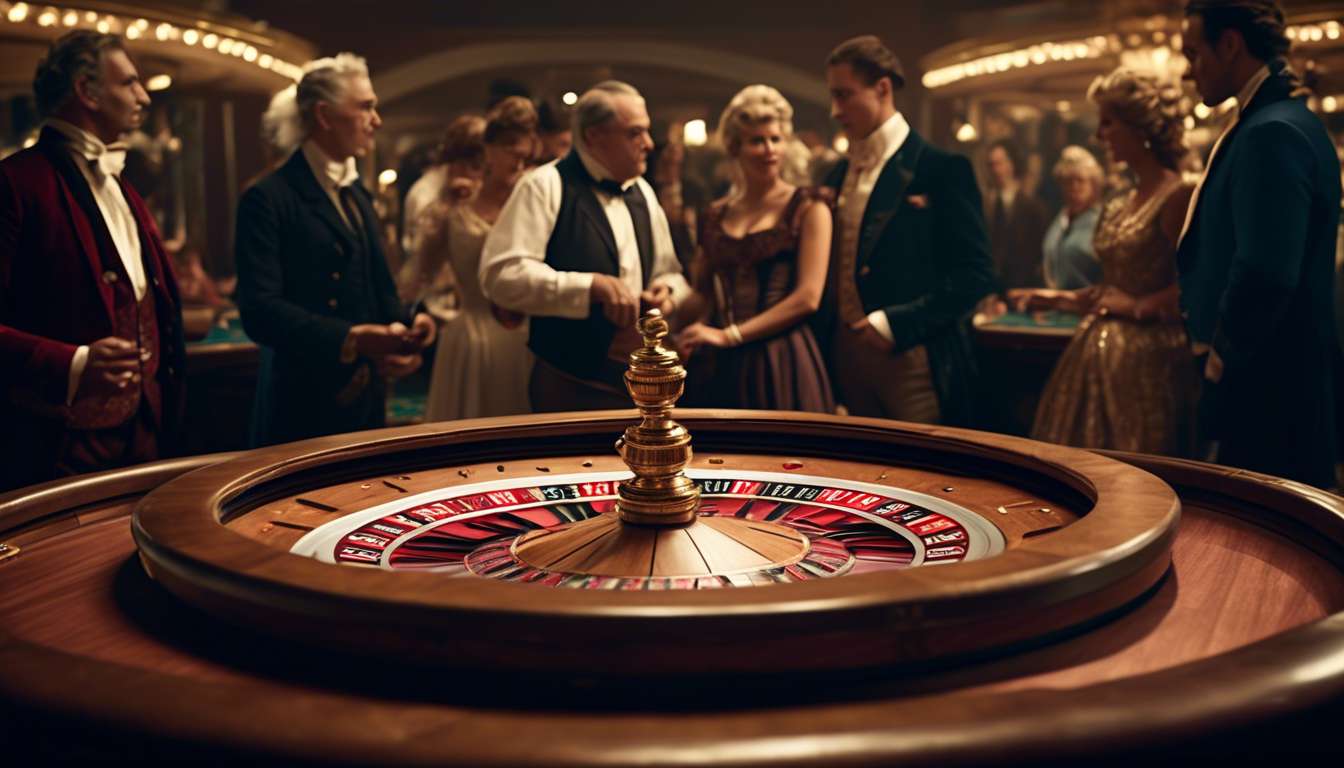As we embark on the exploration of the origins of the roulette game, we find ourselves drawn into a fascinating world where chance and history intertwine. Together, we delve into the rich tapestry of events and innovations that have shaped this iconic game of chance.
Our journey begins in the 18th century, where the seeds of modern roulette were sown in the bustling salons of France. It is here that we trace the ingenious blend of mathematics and entertainment conceived by the likes of Blaise Pascal, whose perpetual motion experiments inadvertently led to the early forms of roulette.
As we navigate through time, we witness how the game evolved, crossing borders and cultures:
- European aristocracy embraced the game, making it a staple in their entertainment venues.
- The vibrant casinos of America later adopted and adapted the game, contributing to its global spread.
By examining these origins, we not only uncover the historical journey of roulette but also gain insights into the enduring allure that continues to captivate players worldwide.
Early Origins in 18th Century France
In the early 18th century, French mathematician Blaise Pascal’s quest to create a perpetual motion machine inadvertently led to the development of the roulette wheel. Imagine us, a community of curious minds, standing alongside Pascal in France, captivated by the idea of endless motion.
While his initial goal wasn’t realized, Pascal’s experiments laid the groundwork for what would become a beloved cultural icon: the roulette game.
As we delve into this historical narrative, we feel a connection to both the past and the thrill of innovation. France, with its rich history of intellectual pursuit, provides the perfect backdrop for this serendipitous invention. Pascal’s work wasn’t just about numbers and machinery; it was about pushing boundaries and finding joy in discovery.
Roulette, with its spinning wheel and the anticipation it brings, unites us in shared excitement. It’s a game that transcends time, connecting us to a moment of ingenuity in 18th century France. We belong to this legacy of exploration and chance.
Influence of Blaise Pascal’s Experiments
Pascal’s experiments profoundly shaped the evolution of the roulette game, as his pursuit of perpetual motion introduced concepts that paved the way for its creation.
In 17th century France, Blaise Pascal, a brilliant mathematician and philosopher, embarked on a mission to develop a perpetual motion machine. Though he didn’t achieve this lofty goal, his innovative experiments inadvertently contributed to the birth of the roulette wheel.
Tracing the roots of roulette:
- Pascal’s work can be connected back to his workshop.
- His exploration of probability theory and the mechanics of motion laid the groundwork for the game.
Cultural and historical significance:
- Roulette is one of France’s most enduring legacies in gaming.
- Gathering around the roulette table connects us to a rich history that began with Pascal’s dream of defying the laws of physics.
Together, we can appreciate how Pascal’s intellectual curiosity continues to resonate within the fabric of our shared cultural heritage.
Evolution in European Aristocratic Circles
In the lavish salons of European aristocracy, we witnessed the roulette game evolve from a curious novelty into a symbol of opulence and intrigue. Originating in France, this game drew us together, providing a shared thrill and a sense of belonging among the elite.
The elegance of the spinning wheel, combined with the allure of chance, captivated our imaginations. It was Blaise Pascal’s accidental invention, initially intended as a perpetual motion machine, that morphed into this captivating pastime. His influence lingered in every spin, as we gathered around the table, eager to place our bets.
The roulette wheel became a fixture in the grand estates and palaces of France, where we, as nobles, embraced it as part of our social fabric. The game offered us more than mere entertainment; it was a testament to our status and intellectual curiosity.
As we played, roulette’s magnetic pull fostered camaraderie, deepening our connections within these exclusive circles.
Spread to American Casinos
As the 19th century progressed, Roulette crossed the Atlantic, finding a new home in the bustling casinos of America. Rooted in France and inspired by the mathematical musings of Blaise Pascal, this captivating game was embraced with excitement and allure.
The American gambling halls quickly became vibrant hubs where people from all walks of life gathered to share in the thrill of the spinning wheel.
Together, we watched the little white ball dance across the numbers, holding our breath in anticipation. The sense of community within these casinos was palpable, as Roulette offered not just a game, but a shared experience that bridged backgrounds and brought people together under the glittering lights.
In these moments, we found belonging—a place where stories and fortunes intertwined. As we continued to spin the wheel, Roulette became more than just a pastime; it was a symbol of chance and camaraderie in this new world.
Impact of Cultural Adaptations
As Roulette spread across different continents, we witnessed how various cultures infused their unique twists into the game, enriching its legacy and appeal. What began in France, possibly inspired by Blaise Pascal’s quest for a perpetual motion machine, transformed as it traveled.
Each culture, eager to claim a piece of the game, brought something new to the table. This melding of traditions allowed us to feel connected, sharing in a global pastime that transcends borders.
In Europe, Roulette retained a close connection to its French roots. However, as it reached America, we saw the introduction of the double zero, a change that made the game distinctly American and yet another version of our shared experience.
These adaptations didn’t just alter the mechanics; they deepened our sense of belonging within the game.
We embrace these cultural shifts, recognizing how each version of Roulette enhances our collective identity, uniting us under a shared enthusiasm for this timeless game.
Technological Advancements in Roulette
In recent years, we’ve witnessed remarkable technological advancements that have revolutionized the way we play and experience Roulette. As members of a global gaming community, we can now enjoy this classic game with greater accessibility and excitement.
The digital transformation has brought Roulette into our homes, bridging distances and fostering a sense of belonging among players worldwide. With online platforms, we can share the thrill once confined to the glamorous casinos of France.
Blaise Pascal, the French mathematician, might be astonished to see how his 17th-century invention has evolved. The introduction of live dealer Roulette combines the convenience of technology with the personal touch of a real croupier, ensuring we don’t lose the charm that Pascal’s version offered.
Virtual reality has further elevated our experience, immersing us in an authentic casino environment from the comfort of our living rooms. Together, we’ve embraced these advancements, uniting in our shared appreciation for Roulette’s rich history and exciting future.
Role of Mathematics in Game Development
Mathematics plays a crucial role in game development, providing the foundation for creating balanced gameplay and realistic odds.
When we think about Roulette, a game born in France, we can’t ignore the mathematical genius behind it. Blaise Pascal, a notable mathematician, was instrumental in its development. In our quest to understand Roulette’s origins, we recognize how Pascal’s contributions to probability theory remain vital.
As players, we’re drawn into the allure of the spinning wheel and the chance of winning. However, beneath that excitement lies a world of calculated odds and probabilities. Roulette’s structure, from the numbered pockets to the betting options, relies on precise mathematical calculations. This ensures fairness and keeps the game engaging for us all.
In our shared gaming experiences, mathematics acts as a bridge, connecting us through the thrill of chance and strategy. It transforms Roulette from mere chance to a well-crafted blend of risk and reward, just as Pascal envisioned.
Global Popularity and Enduring Appeal
Throughout the world, we’ve seen this captivating game transcend cultural boundaries, drawing players to its timeless allure and strategic depth. Roulette, born in France and touched by the genius of Pascal, has become a universal symbol of excitement and chance. We find ourselves united in the shared thrill of watching the spinning wheel, hoping for that moment of serendipity when the ball lands in our favor.
As members of a global community, we’re drawn to the elegance and simplicity of roulette. Its enduring appeal lies in its ability to connect us, whether we’re in bustling casinos or enjoying a cozy night at home. The game’s rich history, rooted in 17th-century France, continues to captivate our imaginations and bring us together.
The strategic element that Pascal inadvertently introduced keeps us engaged. We strategize, predict, and celebrate. Roulette is more than a game; it’s a testament to our collective desire for connection, excitement, and belonging.
Conclusion
You’ve explored the fascinating origins of the Roulette game, tracing its roots back to 18th century France and the innovative experiments of Blaise Pascal.
From European aristocratic circles to American casinos, Roulette has evolved with cultural adaptations and technological advancements. Mathematics has played a crucial role in its development, contributing to its global popularity and enduring appeal.
The game’s rich history continues to captivate players worldwide, making Roulette a timeless classic in the world of gambling.

